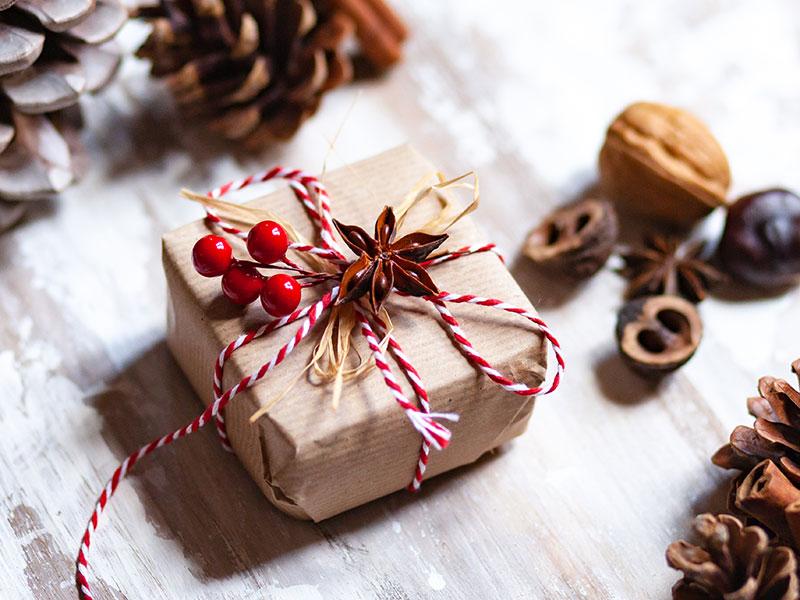If you’re shopping around for wrapping paper, cards, gifts, or food, we’d love you to think about the ways you could enjoy a more sustainable Christmas this year.
How to enjoy a more sustainable Christmas
Are you starting to feel festive yet?
Christmas is only five weeks away so you might have already started buying your festive supplies.
Shop locally
Big retailers are already touting their Black Friday deals but could you support Small Business Saturday instead?
Choosing local traders rather than one of the internet giants will help our businesses and the people who work for them.
It keeps money circulating in the local economy, jobs in the community, and is better for the environment as it cuts transport emissions.
Many outlets offer digital services so it’s easy to buy from the comfort of your own home.
Here are some top local picks:
- Visit your local High Street.
- Find independent businesses in Clevedon through Discover Clevedon and Clevedon Sunday Market.
- North Somerset-based artists, craftspeople, on the Made in North Somerset Marketplace. This online platform enables you to buy directly from the producer, whether it’s food, drink, arts or crafts.
Also see if your favourite local trader has their own website or social media account to buy from.
If you run a local business you can add yourself to the business finder map.
Eco-friendly food and gifts
Christmas can be a time of excess, but there are ways to go greener without cutting back.
The Wildlife Trusts have lots of ideas for an eco-friendly Christmas, including gifts, wrapping, food and decorations, while the Friends of the Earth website has 21 eco-friendly and Covid-friendly Christmas tips (the page was published last year).
Bristol-based charity The Soil Association also has its top 10 ideas to take action and have a more sustainable Christmas, including eating with the seasons and making informed choices about your tree.
No wrapping paper recycling this year
This year we won’t be able to recycle any wrapping paper so it will all need to go in your black bin.
We know this is a big change and might seem counter-productive to our usual recycling messages.
Wrapping paper is difficult to recycle because there are so many varieties, and most are mixed with unrecyclable items such as foil, glitter, ribbon, and tape.
If the amount of incorrect material is too high, the whole load will be rejected by the paper mill.
It will then be disposed of as general waste, resulting in high costs and transport emissions.
The best thing is to avoid using wrapping paper in the first place – which will also help your carbon footprint.
11.8 million kilos of CO2 are emitted to produce the UK’s Christmas wrapping paper - the equivalent of Father Christmas driving around the world 1,600 times.
Now might be the time to think of unique and creative alternatives. Why not try…?
- brown paper – can be recycled with cardboard (just take off any tape or decorative items)
- packaging – a spare cardboard box or jiffy bag can be decorated
- fabric - bring colour to your presents. Scarves, tea towels, handkerchiefs, bandanas, or large napkins could be used. Wrap objects in various shapes by learning the traditional Japanese cloth-folding technique, furoshiki
- old maps or newspaper – create a vintage look but avoid maps with a plastic lining
- jars, tins or gift bags - a lovely, reusable way to display gifts
- baskets –attractive and useful
- children’s artwork.
Christmas recycling collections
Christmas Day, Boxing Day, and New Year’s Day all fall at the weekend this year. There will be no changes to recycling and waste collection days.
Just put your boxes and bins out on your normal days.
You can check collection days on our online collection calendar.
Follow the recycling team on Facebook for hints and tips throughout the year.
Christmas tree recycling
If you’re buying a real Christmas tree this year then consider what you’ll do with it when the festivities are over.
We’re working with local organisations to help unwanted Christmas trees become a useful resource instead.
The majority of trees collected are cut down into chippings so they can be repurposed for land regeneration.
Organisations accepting trees in the New Year include Noah’s Ark Zoo and Farm, St Peter’s Hospice and Weston Rotary in support of Weston Hospicecare.
Last year’s tree collections raised more than £26,000.

